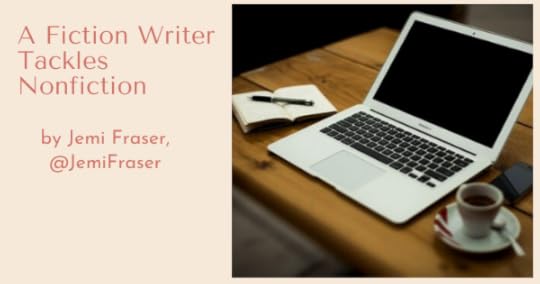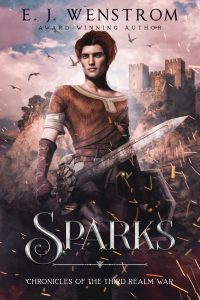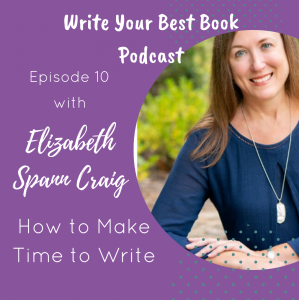Riley Adams's Blog, page 52
April 5, 2020
How I Wrote My Murder Mystery “Murder, Just Because”

by Yolanda Renée, @yolandarenee
When I decided to sit down and write a mystery — I did just that. I sat down and started writing. It's what I've done with every story I've ever written. I've been an avid reader ever since I was a child. I started out with Nancy Drew and progressed from there. In other words, I've read hundreds, if not thousands of books. When I decided to write my own, I was more than ready.
I chose the mystery genre
because I wanted to write what I enjoyed. These are the steps I took. Each
bullet has a link that I'm sure will give you the information you seek on each
topic. The web is full of great information, and I doubt I could improve on it,
but these are my steps, and I hope they'll give you the push you need to start
your writing adventure.
1. Decide on the type of mystery you want to write.
There are at least twelve types of mystery
genres.
2. Decide on your Setting.
The setting is key, in more
ways than one!
If you don't know the place personally, do your research.
Use maps to get street names and know and use the names of businesses such as
restaurants, parks, etc. And yes, you can use the correct names of places,
streets, hotels, etc. It will make the situation real for your readers.
3. Choose the protagonist.
Who is your detective or sleuth? Create a full description with
a complete background. Know them as well as you know yourself. Just be prepared
once you've created them to accept changes, which will come from the character
themselves once they find their voice. (They will speak to you and sometimes
disagree with your direction. Listen to them. They know the story better than
you.)
4. Who is your antagonist?
This character can be even
more important than the protagonist.
I've found they love to take over the story. In these cases,
I make sure the protagonist and the villain get equal time.
5 Create interesting secondary characters.
Don't be surprised if a new individual makes their voice
known once you're deep into the story. And don't forget your victim or victims.
You'll want some empathy from your readers for them.
6. Do your research.
If you don't know anything about motivation or serial
killers or murderers in general, do your research. The FBI has several good
sites online, and there are dozens of books available. Having your own
reference library handy is a plus.
7. What's your weapon of
choice?
Guns, knives, poisons, ball bats, an ax, or whatever you
choose. Each killer has a preference, a reason for the weapon they use. Decide
what that is, or better yet, let them tell you. My serial killers love to make
themselves known.
I own books on investigation, motive, and weapons. I even
have a book of poisons, but there's plenty of information online. However, a
personal library is fun too.
8. Start Writing!
Maybe three steps are all it
takes?
I usually begin my books with a murder. By creating tension
right off, you draw the reader in. They'll want to know who did what and why?
What better way to introduce your protagonist than at the
scene of a crime.
9. Show, don't tell!
Forget detailed backstories on your main characters. All that character
description and backstory you've already written, is just that, your notes. Key
elements can be added as the story moves forward either in dialogue, brief
introductory descriptions, thoughts, or reactions of the character, and even
dreams. But keep the action going!
10. Action, action, action!
Grab the reader from the
get-go!
You want a page-turner, with cliffhangers at the end of all
your chapters because you want your readers to say they could not put it down!
11. Snappy dialogue.
Make your conversations relevant to the scene, and don't forget to add
humor.
12. Be prepared for “writer's block.”
The easiest part of writing is the first few chapters. You're psyched. You're
into your story. You even know how it's all going to end, and you get ahead of
yourself and write that amazing final scene that's been playing out in your
head.
This is easy, you think. But then you realize you've got eleven
chapters and the ending. Oops, how did your characters get from here to there?
The middle of your book is missing, and you have no story
left inside. That's the real definition of writer's block.
My advice is to walk away. Read a book. Take a long walk or
do the laundry. The point is, just put the story away for a while. The answers
will come to you when you least expect it.
My go-to solution to “writer's block” is to ask
the questions I need the answer to during meditation or right before I fall
asleep. The answer is always there in the morning.
If nothing else works, try
these tips…
13. Finished!
Celebrate! You deserve it! Take a break, at least a week,
then go back and start the re-write. Don't be surprised if new ideas jump out,
or that you decide to delete whole chapters. This is where the fun begins, and
the story finally solidifies.
*****
Thank you, Elizabeth, for sharing my latest book release and my
how-to for writing.
I hope it inspires just one would-be mystery writer.
Writer @yolandarenee With 13 Steps to Writing a Mystery:
Click To Tweet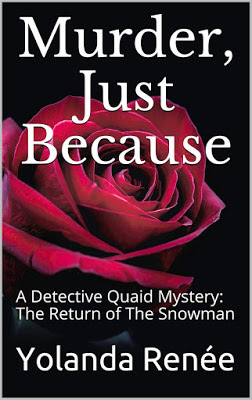 It’s a pleasure to be participating in author Yolanda
It’s a pleasure to be participating in author Yolanda
Renee’s MURDER, JUST BECAUSE Blog Tour through MC Book Tours today.
The author is offering an awesome tour-wide international giveaway. More
information on the giveaway is listed below.
MURDER, JUST BECAUSE
by Yolanda Renée
◊ Genre: Mystery, Thriller, Suspense
◊ Publisher: Yolanda Renee
◊ Series: Detective Quaid Mysteries
◊ Paperback: 291 pages
◊ Print & eBooks
◊ ISBN-10: 0985820632
◊ ISBN-13: 978-0985820633
◊ Contains explicit sex & graphic violence
“While
this book does contain explicit sexual language and graphic violence, it could
easily be taken from the daily headlines. The content is plausible and
realistic as we look at the world around us. The events in the book are not
overly done but give a pragmatic look at the terrifying actions killers can and
sometimes do take.”
It was a matter of beginner’s luck, but rookie detective Steven
Quaid’s career and reputation as an elite investigator skyrocketed when he
captured one of the most sadistic serial killers in Alaskan history: Stowy
Jenkins, AKA the Snowman. But that was ten years ago.
And now…Jenkins is back. Escaped from prison and on the move, his
bloodlust is stronger than ever, and his methods of torture are even more
horrifying than before. As his bloody rampage continues and the number of
mutilated bodies mounts, terrified Alaskans increasingly doubt Quaid’s ability
to catch the killer again. The detective’s reputation is on the line, and he’s
going to need a lot more than luck, because this time, Jenkins is driven by
more than the thrill of a random kill.
This time, it’s more personal. He’s out for revenge…and his
ultimate target is Quaid. In a deadly game of cat-and-mouse, Jenkins starts
picking off the people in Quaid’s life…slowly, gradually tightening his circle
of corpses and drawing ever closer to the most important person in Quaid’s
life…his wife. Can Quaid do the impossible again? Can he outmaneuver the
killer, or has the detective's luck finally run out?
Author Yolanda Renee
For those
who aren’t familiar with the author, here’s a bit of background on her in her
own words.
At
one time Alaska called to me, and I answered. I learned to sleep under the
midnight sun, survive in below zero temperatures, and hike the Mountain Ranges.
I’ve traveled from Prudhoe Bay to Valdez, and the memories are some of my most
valued. The wonders, mysteries and incredible beauty that is Alaska has never
left me and thus now influences my writing.
Despite
my adventurous spirit, I achieved my educational goals, married, and I have two
handsome sons. Writing is now my focus, my newest adventure!
For more on
Yolanda and her writing, you can connect with her here:
Blog
* Facebook
* Twitter
* Pinterest 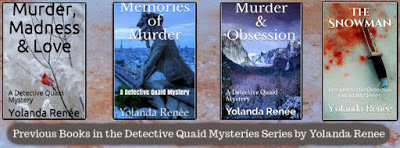
GIVEAWAY DETAILS:
This
tour-wide giveaway is for a complete set of the Detective Quaid Mystery series
books for one winner, paperback copies of MURDER, JUST BECAUSE
for five winners, a $25 Amazon Gift Card, and a Kindle copy of MURDER, JUST BECAUSE for
10 winners.
To enter the
giveaway, just click on the Rafflecopter widget below and follow the
instructions. The widget may take a few seconds to load so please be patient.
If the widget doesn’t show up, just click HERE and you’ll be directed to
the widget.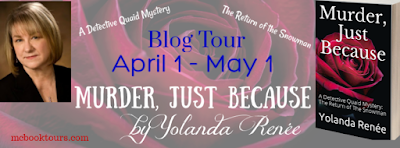
Thanks for
stopping by and be sure to follow Yolanda on her week-long tour HERE. You never know what you
might find out. Do you enjoy watching a character grow from one story to the
next?
a Rafflecopter giveaway
The post How I Wrote My Murder Mystery “Murder, Just Because” appeared first on Elizabeth Spann Craig.
April 4, 2020
Twitterific Writing Links
by Elizabeth S. Craig, @elizabethscraig
Twitterific writing links are fed into the Writer’s Knowledge Base search engine (developed by writer and software engineer Mike Fleming) which has over 50,000 free articles on writing related topics. It’s the search engine for writers.
Have you visited the WKB lately? Check out the new redesign where you can browse by category, and sign up for free writing articles, on topics you choose, delivered to your email inbox! Sign up for the Hiveword newsletter here.
Hope everyone is doing well! Stay safe and take care.
Business / Miscellaneous
4 Mistakes Amateur Self-Publishers Make That the Pros Don’t: @DaveChesson
Everything You Need To Know About Fiction Editing: @TheStoryEditor @IndieAuthorALLI
Grants for Freelancers and Artists During the COVID-19 Pandemic: @womenonwriting
Conferences and Events / Miscellaneous
Coronavirus Updates: Publishing Award Programs Make More Changes: @Porter_Anderson @pubperspectives
The UK's International Booker Prize Shortlist: Digitally Announced From London: @Porter_Anderson
Conferences and Events / NaNoWriMo
Camp NaNoWriMo Gearing Up for April: @NaNoWriMo
Join Camp NaNoWriMo: @NaNoWriMo
Creativity and Inspiration / First Novels
10 Tips for the Aspiring Author: @DragonspireUK
Six Crucial Differences Aspiring Writers Should Be Aware of: @Peter_Rey_
Creativity and Inspiration / Inspiration / Reading as Writers
5 Books That Leave You With Hope for Humanity: @GeektasticLib @tordotcom
11 Indie Literary Magazines You Should Be Reading: by Steven Watson @ElectricLit
Reading Challenge: Overcome the Algorithms: @JamiGold
Hostile Work Environment: Women in Today's Thrillers: @RealLiveCritic @CrimeReads
Is Jane Austen the Antidote to Social Media Overload? @awsamuel @JSTOR_Daily
Download Classic Works of Plague Fiction: From Daniel Defoe & Mary Shelley, to Edgar Allan Poe: @openculture
When Murder Is a Family Affair: @TiffTsao @CrimeReads
Your Guide to Not Getting Murdered in a Quaint English Village: @maureenjohnson @CrimeReads
Why Goodnight Moon is missing from the New York Public Library’s list of the 10 most-checked-out books of all time: @dankois @Slate
7 SFF Stories That Reimagine Some of Your Favorite Classics: by Stubby the Rocket @tordotcom
Creativity and Inspiration / Productivity / Fitting in Writing
The 1 Tool You Need to Become a Better Writer This Year: @MegDowell
How to Create a Time Blocking Schedule with Google Calendar: @authorbrittwang
Creativity and Inspiration / Productivity / Writing Quickly
How to Write Faster: 7 Steps for Writing More Productively: @DaveChesson
12 Simple Strategies For Writing More In Less Time: @MegDowell
Creativity and Inspiration / Writing Life
Quaint English Village Murder Mystery TV Shows with a Million Seasons, for Your Binge-Watching Pleasure During These Hard Times: @oldrutigliano @CrimeReads
How to Build Confidence as a Writer: @MichaelLaRonn
How to Write a Character with Dissociative Disorder When You Have Dissociative Disorder: @OtherGloria @CrimeReads
12 Signs You’re Finally Ready to Write That Novel: @MegDowell
Plan with me | Writing & Social Media Planner | Mar 30- Apr 5: @jlw_writes
Short Existentialist Plays Starring You, Your Coworkers, and Your Family During Quarantine: @MikeJungman @mcsweeneys
Can you manage a newsletter and a book? @pubcoach
The Art of Single-Tasking and Writing Your Book: @CathyFyock @EdieMelson
Writing In The Time Of Pandemic: @MaryGillgannon @RMFWriters
Days Without Name: On Time in the Time of Coronavirus: @lithub @HeidiPitlor
Boredom is a pit stop: @austinkleon
Writing Every Day Won’t Make You More Successful — But This Daily Habit Might: @MegDowell
How To Nail Writing From Home: @KMAllan_writer
One writer's struggle with depression: @ritetig
Genres / Fantasy
Do Rulers in Fantasy Need to be Evil or Inept? @cyallowitz
Fantasy Fortifications: Technology and Materials: by Toni Šušnjar @mythicscribes
Fantasy Fortifications: Design: by Toni Šušnjar @mythicscribes
Genres / Historical
https://t.co/ZWBRtfkCjm: @Janet_Reid
Genres / Horror
The Vengeful Female Ghosts of J-Horror (Japanese Horror): @LOHFiction
Genres / Mystery
In Praise of the Richly Detailed Historical Crime Novel: by Burt Solomon @CrimeReads
Crime Writing: The Danger of Complacency for Police Officers: @LeeLofland
Genres / Non-Fiction
A Fiction Writer Tackles Nonfiction: @jemifraser
What's Harder and Easier About Nonfiction vs Fiction: @jemifraser
Promo / Book Descriptions and Copywriting
An Easy Way to Write a Book Cover Blurb: @ZoeMMcCarthy
Promo / Miscellaneous
Book Promotion in the Time of Coronavirus: @FauziaBurke
Book Promotion: Tips for Making it Work: @StephPostAuthor @LitReactor
Promo / Newsletters
7 Expert Tricks To Improve Your Author Newsletter: @DavidGaughran
Promo / Social Media Tips
11 Must-Have Instagram Apps for Writers: @CaballoFrances
Promo / Websites
55 Social Media Hashtags For Book Authors (And How To Use Them): @webdesignrelief
How to Set up Your Author Website Quickly and Easily: @PaulineWiles @theindiepubmag
How to Drive Traffic to Your Author Website: @FauziaBurke
Publishing / Miscellaneous
Independent bookstores turn to crowdfunding to stay afloat during the crisis:
Indie Booksellers: Tips for Setting Up an Online Storefronts Quickly: @JaneFriedman
Producing an Audiobook with Audible's ACX: @WendyNikel @sfwa
Happy ever after: why writers are falling out of love with marriage: @mialevitin @GuardianBooks
Publishing / News / Amazon
3 Ways to Combat Amazon Reviews Disappearing: @Bookgal
Publishing / News / International Publishing
Coronavirus: Italy's Creative Industries: ‘On Their Last Legs': @Porter_Anderson @pubperspectives
Coronavirus Industry Resource Lists: IPA Focuses on Policy, Support: @Porter_Anderson @pubperspectives @IntPublishers
Coronavirus: US PubWest Appeals to Amazon for Relief on Fees: @Porter_Anderson @pubperspectives
Publishing Amid France's Coronavirus Lockdown: ‘We Don't Want To Panic': @oliviasnaije @pubperspectives
Coronavirus: Malaysia Cancels Its Kuala Lumpur World Book Capital Opener: @Porter_Anderson @pubperspectives
Tomie dePaola, children's author and illustrator, has died: by @rriess_TV @hrsilverman
US S&S Partners With https://t.co/Ii7MpPQQBf; UK Books Are My Bag Has Mackesy Designs: @Porter_Anderson @pubperspectives
BolognaFiere Announces an Online Rights Trading Option: @Porter_Anderson @pubperspectives
International Children's Book Day: WHO, UNICEF, and IPA Open ‘Read the World': @Porter_Anderson @pubperspectives
Garzanti's New Book for Bergamo: ‘Creativity Does Not Stop by Decree': @Porter_Anderson @pubperspectives
Publishing / Options / Traditional Publishing / Rejections
Why Rejections From Literary Agents and Editors Aren't Always Bad: @MegLaTorre
Writing Craft / Beginnings
Considerations for the First Page of Your Novel: @LiveWriteThrive
Writing Craft / Characters / Development
How to Write Character Voice: @shaelinbishop @ReedsyHQ
Cause and Effect: Does Your Character's Behavior Make Sense? @AngelaAckerman
Writing Craft / Characters / Protagonists
How Can We Make Our Protagonist More Proactive? @JamiGold
Writing Craft / Endings
How to End a Story Well: @davidfarland
Writing Craft / Lessons from Books and Film
Writing Lessons from Video Games: Forgotton Anne: @VictoriaGHowell
Writing Craft / Literary Devices
How to Use Symbolism: @shaelinbishop
How To Master Similes And Metaphors In Your Writing: by Robert Wood @standoutbooks
Writing Craft / Miscellaneous
Approaching Disability in a Pirate Story: by Fay Onyx @mythcreants
Writers: Embrace the Bleak in Your Stories: by Bonnie Randall
Getting to the next level as a writer: @Janet_Reid
Types of Narrators: @victoria_grif7
Stitching Together Multiple Timelines: @constancesayers @DIYMFA
The Core of Every Novel: The Big Want & The Big Fear: @Spencimus
Don't give your Readers a Reason to Reject Your Novel: @JodieRennerEd @annerallen
Writing Craft / Pre-Writing / Story Beats
Beat Sheet for “The Office” Episode You Haven't Seen: @Zhangarang @savethecat
Writing Craft / Punctuation and Grammar
Canceled vs. Cancelled (Grammar Rules): @robertleebrewer @WritersDigest
Writing Craft / Revision
Revision: Making a Mess Less Complicated: by S.E. Jones @TheRyanLanz
Writing Craft / Revisions / Critiques
Find your writing problems before editing: @pubcoach
When to Bring in Beta Readers: @BookEndsJessica
Writing Tools / Apps
How to Use Scrivener to Write Scenes That Work: by Joslyn Chase @write_practice
Creating Custom Scrivener Templates: @Gwen_Hernandez
Writing Tools / Miscellaneous
How to Write Better With Dictation: @SelfPubForm @TheKJA
Uncategorized
Cartoonist @tomgauld with a ‘Choose Your Own Writing Adventure' that sounds very familiar:
An important thread for writers to read. Think ahead and ask questions:
The Top Writing Links From Last Week Are On Twitterific:
Click To Tweet
The post Twitterific Writing Links appeared first on Elizabeth Spann Craig.
March 29, 2020
A Fiction Writer Tackles Nonfiction
by Jemi Fraser, @jemifraser
I am normally a fiction writer. I write romance, suspense, and flash fiction from a wide variety of genres. When our family was hit by dementia, I decided to tackle this new-to-us disease in writing in order to help other families facing those early stages of the disease.
Nonfiction and fiction share some similarities, but they are also different in many ways. I discovered that writing nonfiction is easier than writing fiction. It is also much more difficult.
Easier: the story is already there
Harder: the story is already there
Sure, the story is there, but (at least in the case of Dancing With Dementia) the story is life itself. The story is all parts of life intertwined in a big, jumbled mess of timelines and emotions and details.
Choosing which parts belong in a story that is to be shared with the world is the challenge. The parts you choose need to be interesting and connect to your theme and they need to showcase that theme while staying true to life.
Easier: the characters are real people
Harder: the characters are real people
In fiction, we create characters. We invest time and energy into creating characters who are as real as we can make them.
In my non-fiction work, the characters are fully evolved people complete with backstories, emotional investment in the story, flaws, and strengths. Putting those people on paper to share with the world involves all kinds of risks, both to the people in the story and to the author. Keeping an unbiased perspective on the characters (and yourself if you’re a character as well) is difficult but necessary.
Easier: audience is key
Harder: audience is key
If an author wishes to sell, it’s important to keep the audience in mind. Who is the target audience? Why will they want to read the book? What do they want from the book?
Fiction tend to focus on entertainment. Nonfiction (in this case anyway) focuses on a blend of information and entertainment. Even informational texts should be entertaining enough to keep the audience reading.
Knowing what parts of our experiences would help the audience and entertain them at the same time was a challenge. In the end, some of our stories involving Mom didn’t make the cut for the book because they weren’t sufficiently entertaining or informative.
So how do we switch our brains from fiction to nonfiction mode (or nonfiction to fiction)?
For me it’s all about character and emotion. No matter what I’m writing, I need to put myself in the head of the character.
For Dancing With Dementia, it wasn’t hard to slip into my concerns about Mom as those concerns were never far from the surface.
How about you? Any other thoughts to add about the difference between fiction and nonfiction? When you read nonfiction, do you want to be both entertained and informed?
A Fiction Writer Tackles Nonfiction (by @JemiFraser) :
Click To Tweet
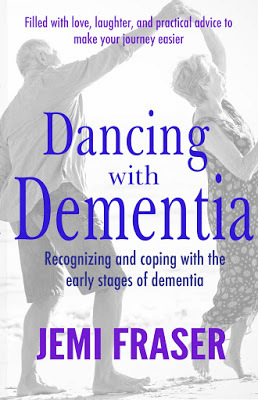
It’s a pleasure to be participating in author Jemi
Fraser’s
Recognizing and Coping with the Early Stages of Dementia Blog Tour
through MC Book Tours today.
The author is offering a tour-wide international giveaway of an Amazon
Gift Card. More information on the giveaway is listed below.
Recognizing and Coping with the Early Stages of Dementia
by Jemi Fraser
◊ Genre: Nonfiction, Memoir
◊ Publisher: Just Jemi Books
◊ eBooks
◊ ISBN-13: 978-1-9991258-1-3
Dementia and Alzheimer’s touch the lives of millions around the
world, but so much is still unknown.
As first-generation Canadians, we didn’t recognize
the early warning signs. We didn’t know the differences between regular aging
and the early stages of dementia. We’ve made mistakes but we’ve learned a lot.
DANCING
WITH DEMENTIA will help you:
•Identify those early warning signs
•Use visuals to improve communication
•Choose your words wisely
•Redirect and reassure
•Stay calm and cope with your own emotions
•Consider nursing home options
•Improve caregiver self-care
We’ve learned to dance the early steps of the
disease with our love and laughter intact. If you are looking for help
recognizing early signposts along with practical ways to cope with early
Dementia and Alzheimer’s, this book is for you.
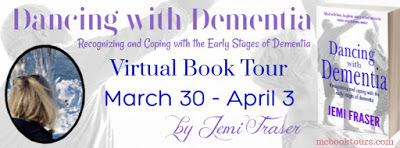
DANCING
WITH DEMENTIA buy
links:
Amazon.com Amazon.ca Apple Books
Barnes & Noble Kobo
Add DANCING WITH DEMENTIA
to your Goodreads shelf
For those
who aren’t familiar with the author, here’s a bit of background on her.
 Jemi Fraser
Jemi Fraserwrites both fiction and nonfiction. Her nonfiction work focuses on the ways
that dementia has impacted her family. Her fiction work varies from
contemporary romance to suspense and flash fiction. Years as a teacher have
taught Jemi that life is short and that happy endings are a must.
Jemi lives
in Northern Ontario, Canada where snow is always a topic of conversation and
the autumn leaves make everything better.
For more on
Jemi and her writing, visit her following sites:
Website
Just Jemi Blog
Dancing
With Dementia blog
Amazon
Page
BookBub Goodreads
Quick
Tips Videos
GIVEAWAY DETAILS:
This
tour-wide giveaway is for a $20 Amazon Gift Card . The giveaway is
open internationally.
To enter the
giveaway, just click on the Rafflecopter widget below and follow the
instructions. The widget may take a few seconds to load so please be patient.
If the widget doesn’t show up, just click HERE and
you’ll be directed to the widget.
Thanks for
stopping by and be sure to follow Jemi on her week-long tour HERE. You never know what you
might find out. I hope dementia hasn’t touch your family or friends, but in
case it has do you have any tips to share on dealing with this terrible
disease?
Photo on Visualhunt.com
The post A Fiction Writer Tackles Nonfiction appeared first on Elizabeth Spann Craig.
March 28, 2020
Twitterific Writing Links
by Elizabeth S. Craig, @elizabethscraig
Twitterific writing links are fed into the Writer’s Knowledge Base search engine (developed by writer and software engineer Mike Fleming) which has over 50,000 free articles on writing related topics. It’s the search engine for writers.
Have you visited the WKB lately? Check out the new redesign where you can browse by category, and sign up for free writing articles, on topics you choose, delivered to your email inbox! Sign up for the Hiveword newsletter here.
Business / Miscellaneous
How To Sell Your Books Directly To Readers And Get Paid Immediately: @thecreativepenn
Conferences and Events / NaNoWriMo
The Folks at @NaNoWriMo Are Launching #StayHomeWriMo:
Creativity and Inspiration / First Novels
Tips for a First Novel: @KayKeppler @BethBarany
12 Quick Writing Tips for Beginners (and Anyone Returning From a Long Break): @MegDowell
Creativity and Inspiration / Inspiration
Eight Tricks To Spark Creativity: @10minnovelist
No one knows what will work: @DanBlank
Creativity and Inspiration / Inspiration / Reading as Writers
On reading more than one book at a time: @austinkleon
The New Gothic: Feminist and Unapologetic: by Kim Taylor Blakemore @CrimeReads
The best distance learning is reading a book: @austinkleon
Creativity and Inspiration / Productivity / Writing Quickly
How to Write Faster and Work Smarter: @WritersCoach
Creativity and Inspiration / Writing Life
12 Bad Writing Habits You Should Break This Year: @MegDowell
Writing Community: There's Safety in Numbers: @JamiGold
Launching a Debut Novel in Middle of a Global Pandemic: @ThisHammer @WriterUnboxed
Haven’t You Finished that Novel Yet? @plotwhisperer
3 Reasons You Should Keep a Writing Journal: @WordNerdsVlog
How to Write During a Pandemic: @tessawegert
Finding Your Writing Pace: @AnneJanzer
“Ha,” said Writing: @LWhitehouse5 @WomenWriters
Confuse and alarm your misbehaving kids with this 15th century guide to good behavior: @cesegal @lithub
How to Tell If You Have What It Takes to Succeed as a Writer: @manzanitafire @JaneFriedman
Writerly Tasks to Do Among the Chaos: @BE_Sanderson
Running the Novel-Writing Marathon: @PaulaSMunier @CareerAuthors
5 Stereotypes About Writers (that are actually true): @shaelinbishop @ReedsyHQ
Feeling overwhelmed? How art can help in an emergency: by Olivia Laing @GuardianBooks
10 characteristics of highly productive writers: @beprolifiko
“20 Mistakes I Made Writing that You Should Never Do … But I Would Probably Do Again, If I Started All Over”: @AmongTheZombies @LitReactor
When Your Book Fails: @alexadonne
Impatience and Craft: @CorriganWithAC @brevitymag
You Have to Risk it All: Inside the Harrowing Creative Shift of @jennienash : @DanBlank
Writing Through the Stress: @WordNerdsVlog
How To Be Productive While Working From Home: @authorkristenm
This Is When You’re Most Likely to Lose Interest In a Writing Project (and How to Keep Going): @MegDowell
Genres / Fantasy
10 Rules for Creating Magical Characters: @LisaLatteBooks
Genres / Miscellaneous
When Your Christian Fiction Needs Some CPR: @KatyKauffman28 @EdieMelson
Genres / Mystery
Interested in Writing a Cozy Mystery? My Tips: At @xtinakayebooks
Are Crime Writers as Twisted as Our Characters? @CrimeReads @BryanGruley
Tips for Writing Bibliomysteries by Lily Charles:
Tips for Researching Crime Novels: @MargotKinberg @SueColetta1
Genres / Non-Fiction
5 Nonfiction Rules Fiction Authors Often Break: @brianfinneywri1 @DIYMFA
Promo / Book Reviews
5 Tips for Scoring Book Reviews in 2020: @cleemckenzie @TheIWSG
Promo / Miscellaneous
5 Self-Publishing Book Marketing Tips for Your Novel’s Launch: by Desiree Villena @ReedsyHQ @KillerNashville
Selling Your eBooks Using a Sales Funnel: @Lachybe @ProWritingAid
What The Piña Colada Song Teaches Us About Marketing: @DavidGaughran
Let Your Characters Engage with Fans Online: @sandrabeckwith @JFbookman
Promo / Social Media Tips
Survival guide to Twitter for authors and writers: @debemmitt
2020 literary calendar with 122 occasions for book fans: @sandrabeckwith
How to Create an Instagram Content Calendar: @brimorganbooks
Publishing / Miscellaneous
Weekend Reality Check: Our Bookstores and What's ‘Essential': @Porter_Anderson @pubperspectives
How to Publish a Book in 2020: A 10-Step Guide for New Authors: @ReedsyHQ
Publishing / News / International Publishing
Waterstones staff say their health is at risk as stores stay open: @JoshHalliday @GuardianBooks
Coronavirus: Singapore's Children's Fest Postpones; Rathbones' Folio Prize Is Digital: @Porter_Anderson @pubperspectives
Industry Resource Lists: Publishers' Responses to Coronavirus Pandemic: @Porter_Anderson
Italy's Publishers Issue Coronavirus Alert: 18,600 Fewer Titles: @Porter_Anderson @pubperspectives
Coronavirus: EIBF Issues Appeal for Booksellers; Wales' Hay Festival Reaches £79,000: @Porter_Anderson @pubperspectives
More Coronavirus Industry Resource Lists: Home Education: @Porter_Anderson @pubperspectives
Publishers Sign Onto a Coronavirus ‘Education Continuity License': @Porter_Anderson @pubperspectives
China Bestsellers February 2020: A Market Stilled by Contagion: @Porter_Anderson
Coronavirus: International Booker's Shortlist; Women's Fiction's Delay; Fane's Changes: @Porter_Anderson
Coronavirus Worklife: Sweden's Grand Agency Navigates a ‘Really Slow Tempo': @Porter_Anderson @pubperspectives
BookExodus: More Big Five Withdrawals, and BISG Opens a COVID-19 Survey: @Porter_Anderson @pubperspectives
India's Juggernaut Opens #ReadInstead: A Campaign and Literature Fest: @Porter_Anderson @pubperspectives
Coronavirus: Canadian Publishers and Access Copyright Open ‘Read Aloud Canadian Books': @Porter_Anderson @pubperspectives
Frankfurter Buchmesse Opens Fellowship and Invitation Program Applications: @Porter_Anderson @pubperspectives
We're All in It Together: by Richard Charkin @pubperspectives
Publishing / Options / Self-Publishing
Become a Writer: How much does it cost to self-publish a book? (2020): @MichaelLaRonn
How to Publish with KDP: @harmony_kent @StoryEmpire
Publishing / Options / Traditional Publishing
How to Choose an Agent Amid Competing Offers: @Bpoelle @JaneFriedman
Publishing / Options / Traditional Publishing / Querying
Literary Agents: 10 Quick Tips to Snaring a Good One: @Bpoelle @WritetoDone
Finding an Agent: @NathanBransford @NaNoWriMo
How To Pitch Your Book To Agents, Publishers And Readers: @KateWritesBooks @thecreativepenn
Publishing / Options / Traditional Publishing / Rejections
How To Get Over Fear of Rejection: @Bang2write
Publishing / Process / Legalities
How to Copyright Your Book in Under 7 Minutes: @DaveChesson
How and When Should Writers Use a Pen Name or Pseudonym? @robertleebrewer @WritersDigest
Publishing / Process / Self-Publishing
How Can Self-Published Authors Get Their Books Into Libraries in the US? @iWriterly
What You Need to Know About Self-Publishing: @thecreativepenn @NaNoWriMo
Writing Craft / Beginnings
Real Life Diagnostics: Which Opening Page Is Better in This Historical Mystery? @Janice_Hardy
Writing Craft / Characters / Arc
Changes: Writing Story Characters Who Grow: @Lindasclare
Writing Craft / Characters / Protagonists
Chronic Hero Syndrome: from Just a Writing Aid
What is an antihero? With examples: @LisaDaily
Writing Craft / Conflict
How to Construct Gripping Fight Scenes: by Whitney Carter @TheRyanLanz
Writing Craft / Diversity
Including diversity where there may be little: @WritingwColor
How to Write Non-Binary Characters: @DN_Bryn
Writing Craft / Lessons from Books and Film
Editor Roundtable: “The Bear Came Over the Mountain”: by Leslie Watts @StoryGrid
Writing Craft / Miscellaneous
What Do People Get Wrong About You? @NatalieAHart @WriterUnboxed
How Compassion Leads to Dynamic Writing: @MaryAnnMcSweeny @brevitymag
The Compelling, Emotional Complex Sentence: @OdysseyWorkshop @WriterUnboxed
What is a Contender Guide? @valerie_francis @StoryGrid
Should Novelists Follow Screenwriting Advice? @parkerpeevy @CockeyedCaravan
Writing Craft / Plot Holes
How to Deal with Plot Holes In Your Story: from Let's Write Some Novels
Writing Craft / Pre-Writing / Naming
Book Titles of the Later Twentieth Century: @thenovelry
Writing Craft / Pre-Writing / Plotting
Situational Archetypes: 5 Essential Hero's Journey Scenes Your Readers Will Love: @DavidHSafford @write_practice
Writing Craft / Pre-Writing / Research
7 Tips For Researching A Novel: @authortaraeast @thecreativepenn
Writing Craft / Revision
7 Ways Audio Can Make Editing Fast & Easy: @editoutloud @kristen_kieffer
Writing Craft / Revisions / Critiques
Writing Groups: Avoiding Common Pitfalls: by A. Howitt @mythicscribes
Writing Tools / Books
To help writers during the coronavirus crisis, @nownovel is offering free writing workbooks:
Uncategorized
Writer life coach Mel Jolly teaches creatives productivity–and is now helping them focus on reducing stress in difficult times:
Playwright Terrence McNally succumbs to complications from coronavirus:
The Top Writing Links From Last Week Are On Twitterific:
Click To Tweet
The post Twitterific Writing Links appeared first on Elizabeth Spann Craig.
March 22, 2020
Bibliomysteries—Educating Readers in a Fun Way
By Libby Ware and Charlene Ball, aka Lily Charles
A bibliomystery is a mystery where books are involved. The stories can take place in bookstores, libraries, auctions, or old houses, and can involve books, manuscripts, or scrolls. Some bibliomysteries center on books while others have a bookish setting only. Some are centered on murder, others on researching a paper trail regarding an author or manuscript.
We both love reading mysteries and especially bibliomysteries. Her are some of our favorites:
Possession, by A. S. Byatt, involves literary research by two twentieth century scholars who are trying to uncover the truth about a nineteenth century British poet.
The Bookman’s Tale; First Impressions: A Novel of Old Books, Unexpected Love, and Jane Austen; and The Lost Book of the Grail, by Charlie Lovett, are mysteries involving manuscripts. Their protagonists are researchers or booksellers.
The Cliff Janeway series by John Dunning stars an ex-police officer who opens a used bookstore. The first is Booked to Die. Each book features a valuable book or books and Cliff Janeway’s search for the book and the culprit.
Camino Island, by John Grisham, is about theft from the Princeton Rare Books Library and an antiquarian book dealer in Florida. Grisham has written a follow-up book, Camino Winds, which will be published this year.
The Booktown Mystery series by Lorna Barrett is set in a booktown in New Hampshire. Tricia Miles owns Haven’t Got a Clue, a mystery bookshop, and has a habit of finding dead bodies.
The Secret, Book, and Scone Society series by Ellery Adams features Nora Pennington, who owns a bookstore in a small North Carolina village. She uses books as therapy by picking out books that her customers will benefit from. (Ellery Adams has also written other series, for example, the Books on Bay series.)
When we told a bookseller friend that we were writing a bibliomystery, she got excited and said, “My favorite part of bibliomysteries is that I learn something.” In our Molly and Emma Bookseller series, we concentrate on one category of books in each novel. Murder at the Estate Sale is about a secret occult library and a missing 17th century manuscript of magic spells. We are currently working on Murder at the Book Fair, which will focus on Children’s and Illustrated Classics.
Molly and Emma are antiquarian book dealers, and since they frequently travel to book fairs to sell their wares, each book will take place in a different setting. Emma is newer to the bookselling world so Molly serves as a sort of mentor to her, so that readers can learn about the arcane world of antiquarian bookselling through their conversations.
We want to introduce our readers in a fun way to the world of bookselling and to different types of collectible books. In Murder at the Estate Sale, for example, right under each chapter title is a brief bookseller’s description of a different collectible occult book. We got the idea from Lea Wait and her Antique Print mystery series in which she has a description of a collectible print under each chapter title.
We hope that, as our readers pursue murders, kidnappings, thefts, and chasing unsavory characters, they will also have fun learning about rare book dealers, manuscripts, book fairs, and the fascinating world of vintage books.

Charlene Ball and Libby Ware. Photographer Amy Gibbons
Lily Charles is the pen name of Charlene Ball and Libby Ware. Under the name Toadlily Books, they sell antiquarian and collectible books. Charlene and Libby married in 2016 and live about a mile from each other in Atlanta. Find them at lilycharles.com
Charlene Ball is also the author of DARK LADY: A NOVEL OF EMILIA BASSANO LANYER (She Writes Press, 2017), winner of the Sarton Award from Story Circle. She has published short stories and articles in academic and literary journals. Until 2009, she worked as a college administrator and instructor.
Libby Ware is a member of Antiquarian Booksellers Association of America and president of Georgia Antiquarian Booksellers Association. She is a fellow of The Hambidge Center for Creative Arts and Sciences. Her debut novel, LUM, won the American Library Association’s Stonewall Honor Book in Literature, a gold medal by the Independent Publishers Association, and was a finalist for Lambda Literary’s Debut Novel Award.
Tips for Writing Bibliomysteries by Lily Charles:
Click To Tweet
Photo on VisualHunt
The post Bibliomysteries—Educating Readers in a Fun Way appeared first on Elizabeth Spann Craig.
March 21, 2020
Twitterific Writing Links
by Elizabeth S. Craig, @elizabethscraig
Twitterific writing links are fed into the Writer’s Knowledge Base search engine (developed by writer and software engineer Mike Fleming) which has over 50,000 free articles on writing related topics. It’s the search engine for writers.
Have you visited the WKB lately? Check out the new redesign where you can browse by category, and sign up for free writing articles, on topics you choose, delivered to your email inbox! Sign up for the Hiveword newsletter here.
Business / Miscellaneous
For Publishers and Nonprofits Facing Cancellation, https://t.co/1xgCklUkaP Offers Services Free: @Porter_Anderson @pubperspectives
Should I Use A Sensitivity Reader? @helpfulsnowman
No Sales or Lackluster Sales: It Isn't the Reader, It's the Book…Really: @KristenLambTX
Planes, Readings, and Mayhem: 1 Writer's Year on the Road: @Gabino_Iglesias @LitReactor
How to Create a Business Plan for Your Indie Author Business: @miblart @IndieAuthorALLI
How much does it cost to self-publish a book? @BookDesignBook
Why Do Writers Hire Book Coaches? @jennienash @JaneFriedman
Posting reviews when you're a writer: @Janet_Reid
Will the Coronavirus Hurt Book Sales? @MichaelLaRonn
Conferences and Events / Miscellaneous
Attend the Free SelfPubCon: @AngelaAckerman
IPA and Norwegian Publishers Association Cancel Lillehammer's World Congress: @Porter_Anderson @pubperspectives
Jacks Thomas Leaves the UK's Reed Exhibitions and London Book Fair: @Porter_Anderson @jacksthomas @LondonBookFair @pubperspectives
British Book Awards: Ceremony Postponed, Some Winners Announced: @Porter_Anderson @pubperspectives
BookExpo Moves to July in New York City: Coronavirus Update: @Porter_Anderson
Books that were to be presented at London Book Fair: @Porter_Anderson @pubperspectives
Creativity and Inspiration / Goal setting
5 Places to Keep Goals … and 2 Places you Shouldn't: @DebraEckerling
Creativity and Inspiration / Inspiration
Best-selling children’s author Mo Willems on sparking creativity and joy: @The_Pigeon @paulsolman
3 Life-Changing Rules for Finding More Writing Inspiration: @KMWeiland
Creativity and Inspiration / Inspiration / Reading as Writers
8 Stories About What Really Happens on Campus: @ElectricLit @carolinezancan
A Beginner's Guide to African Crime Fiction: @detectivekubu @CrimeReads
Your coronavirus reading list: reader suggestions to bring joy in difficult times: @GuardianBooks
7 Biographies That Are Secretly Memoirs: @jennshapland @ElectricLit
8 True Crime Podcasts to Listen To in 2020: by Lizzy Steiner @CrimeReads
12 Books About Pandemics: @ElectricLit
Italy's Answer to Coronavirus is a Classic Published Almost 200 Years Ago: @alessioperrone @lithub
Sometimes You Need a Book To Just Make You Laugh: A Reading List: @TheNormanNation @lithub
5 Pandemic Books to Enjoy During Self-Isolation: by Tom Ashford @SelfPubForm
Creativity and Inspiration / Motivation
Getting Serious About Your Writing Career: @jamesscottbell @killzoneauthors
Creativity and Inspiration / Productivity / Fitting in Writing
Making Time To Write: @evmysterywriter @killzoneauthors
You Might Be Scheduling Your Writing Time All Wrong: @MegDowell
The Key to a Writer’s Productivity: Just Say No: @PaulaSMunier @CareerAuthors
“Done vs Good: What I’ve learned so far about getting unstuck”: @nancy_reddy @pankmagazine
Creativity and Inspiration / Productivity / Writing Quickly
How To Focus And Be Indistractable: @nireyal @thecreativepenn
“Why I’m Not Tracking My Writing Progress Anymore”: @MegDowell
Creativity and Inspiration / Writing Life
Going to Dinner with Your Troll, and Other Tales of Writing Gone Viral: @cmaum @lithub
When You Fear What Others Think: @10minnovelist
Why a Writer Suffers Jaw Pain and How to Fix It: by Ken Marshall @colleen_m_story
26 Things to Remember About Being a Writer: @EdieMelson
11 Library Hacks for Riding Out the Coronavirus: @EveryLibrary
How to Build Your Best Writing Life in 2020: @kristen_kieffer
When hope is hard to find: @hmgardner @TheIWSG
Spring Cleaning for Writers:
5 Tips for Creating a Relaxing Writing Space: by Heather Viera @DIYMFA
10 Lessons from a Decade of Writing: @MBjorkWrites
Writers, Sometimes We Just Need to Admit We Can’t Do It All: @bethvogt @EdieMelson
The New Story Idea You Never Asked to Meet: @MegDowell
Writing Tips In Perspective: @caridubiel
How Italian booklovers are coping in the coronavirus lockdown: @MassimoCarlotto @GuardianBooks
COVID-19: A Writer's Guide to Self-Care: @MBjorkWrites
Margaret Heffernan on These ‘Uncharted' Days of Coronavirus Pandemic: @Porter_Anderson @pubperspectives
“My book comes out next year. Do I even believe in next year?” @lillydancyger @ElectricLit
6 Steps to Setting Yourself up Financially as a Writer in 2020: @sacha_black
Do You Really Want to Be a Writer? @jimdempsey @WriterUnboxed
9 Places To Meet Fellow Authors (And How To Connect Once You Do) : by Rebecca Langley @standoutbooks
Tips for Working From Home: @PenPaperPad
Genres / Fantasy
Five Common Masquerade Explanations and Why They’re Bad: by Chris Winkle @mythcreants
Six Military Blunders in Speculative Fiction: by Oren Ashkenazi @mythcreants
Pro tips for writing and publishing speculative fiction: by Jack Smith @kijjohnson @Janice_Hardy @LindaNagata @TheWriterMag
How Can I Put Swords in a High Tech World? by Oren Ashkenazi @mythcreants
Genres / Horror
Six Works of Meta-Horror That Break All the Rules: by Sam Reader @TorNightfire
Genres / Miscellaneous
Crossing Genres: A Wild Writing Path: @kathieshoop @WomenWriters
Genres / Mystery
Are Small Town Mysteries Comforting Fictions—or Terrifyingly Relevant? @amykgreen @CrimeReads
Genres / Poetry
A Primer on Speculative Poetry: @BlueTeaEditing @wvancamp
Genres / Screenwriting
Writing The Perfect Hallmark Holiday Romantic Comedy Movie: by Mark Sevi @CreativeScreen
Genres / Young Adult
Awesome Tropes in YA Fiction: @_HannahHeath
Promo / Book Descriptions and Copywriting
Writing A Book Blurb In 4 Easy Steps: @KMAllan_writer
Promo / Miscellaneous
BookBub Reviews Offer an Alternative to Goodreads and Amazon: @annerallen
Social Distancing: The Perfect Time for Digital Outreach: by Sue Campbell
Promo / Social Media Tips
The Essentials of Your Goodreads Author Page: @mindofkyleam @ProWritingAid
Social media doesn't sell books, but… @DanBlank
How to Get More LinkedIn Engagement and Clicks: by Robert Brill @SMExaminer
Promo / Speaking
How Writers Can Craft an Ending for Their Presentation: @YvonneOrtega1 @EdieMelson
Publishing / Miscellaneous
The 3 Levels of Trust in Publishing: @johnpwriter
Publishing's Workforce: Early Shifts to Remote Operations in the Coronavirus Pandemic: @Porter_Anderson @pubperspectives
Coronavirus: Macmillan and PRH Ease Library Digital Book Availability: @Porter_Anderson @pubperspectives
Coronavirus: Amazon Temporarily Deprioritizes Books and More: @Porter_Anderson @pubperspectives
Publishing / News / International Publishing
Turkey's ITEF Calls for Fellows; Ferrante Audio Rights Go to PRH: @Porter_Anderson @pubperspectives
Coronavirus Has Ground Chinese Publishing to a Halt: by Na Zhong @lithub
Coronavirus: International Publishers Make COVID-19 Research Content Freely Available: @Porter_Anderson @pubperspectives @AmericanPublish
Coronavirus: Sharjah's World Book Capital Ceremony Cancels, as Does Canada's Tech Forum: @Porter_Anderson @pubperspectives
Coronavirus: Spanish and Italian Book Industries Sound the Alarm: @Porter_Anderson
Publishing / Options / Self-Publishing
What is Indie Publishing? And How to Get Started in 2020: @ReedsyHQ
Publishing / Options / Traditional Publishing / Querying
10 Things Literary Agents Look For in an Author: @bookendslit @jmcgowanbks
What does it mean when an editor or agent says your manuscript is “quiet?” @TracyMarchini @bookendslit
Writing Craft / Beginnings
5 Common Story Openings to Avoid—If You Can Help It: @JaneFriedman
Middle Grade Critique: @Kid_Lit
Writing Craft / Common Mistakes
The reader should generally know what your narrator knows: @NathanBransford
Writing Craft / Conflict
Creating Conflict in Your Story: @KarenCV
Writing Craft / Drafts
The Freedom of Writing Without Chapters: @Janice_Hardy
Writing Craft / Lessons from Books and Film
Believe, Care, Invest: Sethe and Others in Toni Morrison’s “Beloved”: @CockeyedCaravan
Believe, Care, Invest: Rahel in Arundhati Roy’s “The God of Small Things”: @CockeyedCaravan
How Edith Wharton's Novel of New York High Society Speaks to Class Divisions Today: @Egangoonsquad @lithub
Writing Craft / Miscellaneous
The Coronavirus and the Crisis Novel: by Mark Alpert @killzoneauthors
Pandemic and Pandemonium: Sickness in Horror: by T.L. Bodine
The Subjective Mood: @AdamOPrice @The_Millions
Writing Craft / POV
Tips for Writing Multi-POV Novels with Distinct Voices: @katelizabee @WomenWriters
Writing Craft / Pre-Writing / Plotting
Additional Reading on the Theme of Man and the Natural World: @Sara_HeartStory @DIYMFA
What makes a plot intriguing? 6 ideas: @nownovel
Writing Craft / Punctuation and Grammar
Capitalizing Disease Names: Why Ebola Is Capitalized and Coronavirus Is Not: @GrammarGirl
Writing Craft / Subtext
Context, Text, Subtext: Understand How Each Works in Storytelling: @SeptCFawkes
Writing Craft / Tension
How to Build Tension in a Scene: 3 Nail-Biting Ways: @suelarkinsweems @write_practice
Writing Craft / Voice
How To Find Your Writer's Voice: @Bang2write
Writing Craft / World-Building
Worldbuilding in the Story Grid Methodology: by Victoria R. Girmonde @StoryGrid
Dive into Worldbuilding: Managing Spaces: @JulietteWade
Worldbuilding: Productivity in Your Society: @JulietteWade
Writing Tools / Apps
Best Book Transcription Services for Authors: @DaveChesson
Uncategorized
Be like Emily:
Social-distancing may prove good for book sales:
Tips from an expert on participating in virtual book events:
The Top Writing Links From Last Week Are On Twitterific:
Click To Tweet
The post Twitterific Writing Links appeared first on Elizabeth Spann Craig.
March 15, 2020
Spring Cleaning for Writers
 by Elizabeth S. Craig, @elizabethscraig
by Elizabeth S. Craig, @elizabethscraig
It's spring (or very close to it) …and time for my yearly spring cleaning. I've never been an enthusiastic cook, but I have been a fairly enthusiastic cleaner. Somehow it helps clear my head. And, with all the emphasis on hand-washing and sterilizing stuff lately, this couldn't come at a better time.
But it's not only closets and cabinets and surfaces that get the spring cleaning treatment at my house: it's also my computer and writing-related items.
Website Updates: This doesn't have to take long. I like to make sure that my social media links aren't broken, that my bio doesn't need updating, and that my sidebars, header, and footer are in good shape. Is your news/events page updated (this is one that's frequently neglected). It's also a good time to make sure your site includes all the recommended basics for writers. See this article by Gill Andrews for Anne R. Allen to make sure you're not making these 5 common mistakes.
Social Media and Amazon Author Page Profiles: This is another area where I make sure my bio is updated. I like to run a quick check on my privacy settings (especially on Facebook, which always seems bent on invading them). It's also good to review which apps are accessing my accounts. Are all my books linked to on my Amazon Author Central page? Am I still happy with the book descriptions on my book pages? How do the editorial reviews look now–should I add any positive reviews?
Email Inbox : This is one of those areas where I could spend an entire morning cleaning up, so I make sure I have a plan and a timer before I start. I take a look at my newsletter subscriptions and unsubscribe to any I've not been opening . I look up specific senders and delete everything from those particular groups or people. I also check to see if I should set up more filters to help make my email more efficient.
Back Up Documents, Covers, and Other Important Files: We've all heard disaster stories. If you don't back up regularly, do it now while you're thinking about it. Even better, set up a system for the future. It could be as simple as emailing files to yourself. Or you could invest in an automatic backup if you'd like to set it up and forget about it.
Organize Files: For more info on how I take care of this task, see this post I wrote last year. If I don't stay on top of this process, I end up with a confusing mess on my computer of early-stage cover drafts, older and un-updated mobis and epubs, and drafts of everything from translations to outlines.
Newsletters: Take a look at your subscribers and consider weeding out readers who have never opened your emails. This is also a good time to check for duplicate subscribers.
Are your business cards updated?
Are you a spring cleaning nut like me? What kinds of things do you do to keep organized and decluttered?
Spring Cleaning for Writers:
Click To Tweet
Photo on Visualhunt.com
The post Spring Cleaning for Writers appeared first on Elizabeth Spann Craig.
March 14, 2020
Twitterific Writing Links
by Elizabeth S. Craig, @elizabethscraig
Twitterific writing links are fed into the Writer’s Knowledge Base search engine (developed by writer and software engineer Mike Fleming) which has over 50,000 free articles on writing related topics. It’s the search engine for writers.
Have you visited the WKB lately? Check out the new redesign where you can browse by category, and sign up for free writing articles, on topics you choose, delivered to your email inbox! Sign up for the Hiveword newsletter here.
Business / Miscellaneous
Do this before you promote your next book: @JustKindleBooks @womenonwriting
Aid Your Editor: Five Tips: @mrs_hanni @DIYMFA
How much money do writers earn when they write? @pubcoach
Conferences and Events / Miscellaneous
Coronavirus: ReedPop Postpones ‘Emerald City'; S&S Exits Bologna; Abu Dhabi Postpones; SXSW Cancels: @Porter_Anderson @pubperspectives
Coronavirus: The Brussels Book Fair Is Open for Business: @oliviasnaije @pubperspectives
Coronavirus: CAMEO Awards Canceled; Sharjah Children's Festival Is Off; PublisHer Misses Its Anniversary: @Porter_Anderson @pubperspectives
International Publishers Association Names 2020 Prix Voltaire Shortlist: @Porter_Anderson @pubperspectives
Coronavirus: PRH Worldwide Exits Bologna; Amazon NYC To Work at Home; Hay Festival Wales Still On: @Porter_Anderson @pubperspectives
London Book Fair Announces Its 2020 International Excellence Award Winners: @Porter_Anderson
Publishing Scotland: 10 Newly Named International Publishing Fellows: @Porter_Anderson @PublishScotland @pubperspectives
Coronavirus: Madrid Fair Moves to October: BISG and Bogota Postpone – Events Updates, March 13: @Porter_Anderson @pubperspectives
Creativity and Inspiration / Goal setting
What’s Missing from Your Goal Achievement Toolbox? @MichaelHyatt
Creativity and Inspiration / Inspiration / Reading as Writers
Five Fantasy Multiverses: @AKLarkwood @tordotcom
The 20 Most Anticipated Horror Books of 2020: @GiveMeYourTeeth @LitReactor
25 Classic Crime Books You Can Read in an Afternoon: @DwyerMurphy @CrimeReads
The Lure of the Boarding School Mystery: @thrillerchick @CrimeReads
A Brief History of Strong Women in Mystery: @CharlesToddBks @CrimeReads
Top 10 books about toxic masculinity: @anibkatz @GuardianBooks
15 Great Books That Speak to the Lives of Middle-Aged Women: @adacalhoun @lithub
Creativity and Inspiration / Miscellaneous
On the Mathematical Problem of Human Creativity: @Kit_Yates_Maths @lithub
Creativity and Inspiration / Motivation
How to Make It Through the Middle of Your Book: @colleen_m_story
Creativity and Inspiration / Productivity / Fitting in Writing
Getting Back On The Writing Track After a Break: @KMAllan_writer
Creativity and Inspiration / Writing Life
The Myth of Author Multitasking: @JudithBriles @JFbookman
What to Create Before You Take a Writing Break: @KMAllan_writer
Building a Writing Community and Magazine for the British and Irish: @Damo_Dangerman @BardIsles @TheIWSG
12 Ways Writers Can Kick Fear and Do Their Best Work: @Frank_McKinley
Writing a Genre That’s New to You: @theladygreer @WriterUnboxed
How Facing Your Space Could Improve Your Writing: @LiveWriteThrive
Harnessing the Power of Writer Karma: @KarenDeBonis
What's the Ideal Writing Environment? @KristinaAuthor
What Authors Can Learn About Writing From Teaching Others: @greggmillman @thecreativepenn
Genres / Fantasy
History for Fantasy Writers: Time Was: by E.L. Skip Knox @mythicscribes
Fantasy Names are Hard: @PhilAthans
Genres / Historical
Using History to Change the Future: https://t.co/Ekz8r8LpTD and @pmterrell @SouthrnWritrMag
Genres / Mystery
How to Write a Mystery Novel: @robertleebrewer @WritersDigest
Crime Writing: Prisoner Weapons: @LeeLofland
Writing Crime: Myths And Misconceptions About The FBI: @JerriWilliams1 @thecreativepenn
Genres / Screenwriting
Submitting Screenplays: @RobTobin
Genres / Short Stories
Why You Should Flash Your Fiction: @ClaireFuller2 @A_WritersStudio
Genres / Women's Fiction
Embracing the Women’s Fiction Genre Label: @OrlyKonig
Promo / Blogging
Make Your Blog User-Friendly: @JoanHallWrites @StoryEmpire
12 Web-friendly Formats for Structuring Writing Posts: @brotzel_fiction @hopeclark
Promo / Metadata
7 Kindle Keywords: Use all 50 Characters or Not? @DaveChesson
Promo / Miscellaneous
How to Use Endorsements on Amazon and IngramSpark: @Wogahn
6 Categories of Effort for a Book Launch and Their Collected Tactics: @EJWenstrom
Tactics for a Book Launch: @EJWenstrom
How to Promote a Flash Sale on Facebook and Instagram: by Stephanie Fisher @SMExaminer
Promo / Social Media Tips
10 Ways Writers Can Fail Spectacularly at Social Media in 2020: @EdieMelson
Publishing / Miscellaneous
Hachette USA Cancels Publication of Woody Allen Book, ‘After Listening': @Porter_Anderson @pubperspectives
Remembering Publisher Sonny Mehta in London: ‘This Gracious Man': @rogertagholm @pubperspectives
An Interview With the Brussels Book Fair's New Director Marie Noble: @oliviasnaije @pubperspectives
How to Publish with KDP: @harmony_kent @StoryEmpire
Publishing in Times of Crisis: @Porter_Anderson @pubperspectives
Publishing / News / International Publishing
Coronavirus: Canada's Kobo Joins Mondadori in Providing Free Ebooks to Italians in Lockdown: @Porter_Anderson @pubperspectives @kobo
Coronavirus: Quick Publishing Event Updates – Bologna Cancels: Full List Here: @Porter_Anderson @pubperspectives
Coronavirus: Quick Publishing Events Updates – March 12: @Porter_Anderson @pubperspectives
Publishing / Options / Traditional Publishing / Querying
How to Write a Professional Query to Agents, Editors, and Reviewers: @annerallen
Publishing / Options / Traditional Publishing / Rejections
Rejection Reckoning: Why Was Your Book Rejected? @HankPRyan @CareerAuthors
Writing Craft / Beginnings
Real Life Diagnostics: Infodumping in the Opening Page: @Janice_Hardy
Critique: 10 Ways to Write a Better First Chapter Using Specific Word Choices: @KMWeiland
Nail every character's first impression: @NathanBransford
The Stage for Your First Page: @sarahjrexford @A3writers
Writing Craft / Characters / Antagonists
What's in a Villain? by Marissa Frosch @StoryGrid
Writing Craft / Characters / Development
5 Essential Hero's Journey Symbolic Archetypes: @DavidHSafford @write_practice
Expansion Pack: Character Archetypes: @Virgilante @StoryEmpire
Using a Personality Test to Enhance Character Development: @jcwalton24 @DIYMFA
Writing Craft / Characters / Emotion
Writing Characters: Why Emotion Matters: @Lindasclare
Writing Craft / Characters / Protagonists
Why We Need to Let Female Protagonists Just Be Protagonists: @_HannahHeath
Advice for Writing Mom Protagonists: by Chris Winkle @mythcreants
Writing Craft / Common Mistakes
Poor Communication Plots: by T.L. Bodine
5 Ways to Ruin Your Creative Writing: by Joslyn Chase @write_practice
Writing Craft / Conflict
Conflict Thesaurus Entry: Having to Work with an Enemy: @AngelaAckerman
Writing Craft / Dialogue
What Your Choice of Dialogue Tags Says About You: @CWCauthorassist @JaneFriedman
Writing Craft / Endings
Writing a Great Last Line: @rxena77
Writing Craft / Flashback and Back Story
Crafting Effective Backstory: @Lindasclare
Writing Craft / Lessons from Books and Film
Learning From the Movies: The King’s Speech: @jamesscottbell @killzoneauthors
Believe, Care, Invest: Our Choice of Heroes in George R. R. Martin’s “A Game of Thrones”: @CockeyedCaravan
Count Dracula: Misunderstood Monster, Bloodsucking Bastard, And Everything In-Between: @chris_shultz81 @LitReactor
Writing Craft / Miscellaneous
Let Your Characters Tell the Story: @EldredBird
Let’s Talk About Stakes: by T.L. Bodine
Practical Preparedness for your Heroine Facing a Pandemic: @FionaQuinnBooks @MollyMcKew
Fear: Why Humans Crave Stories That Scare Them: @KristenLambTX
What Authors Need To Know About The Use (And Misuse) Of Synecdoche: by Robert Wood @standoutbooks
Top Ten Ways To Improve Your Craft As A Writer: @10minnovelist
Writing Craft / Pre-Writing / Plotting
Spotlight On Structure: The Story Circle by Dan Harmon: @Bang2write
Writing Craft / Pre-Writing / Research
What is a rite of passage? @csmaccath
Writing Craft / Pre-Writing / Story Concept
Ways to develop plot ideas: by Just a Writing Aid
Visions and Impressions: @SeptCFawkes
Writing Craft / Revisions / Critiques
3 Things to Remember When Revising from a Critique: @Janice_Hardy
Writing Tools / Apps
Split and Merge Scenes in Scrivener: @aprildavila
Writing Tools / Miscellaneous
300+ best tools and resources for working from home [2020]: by Maddy Leslie @wearearticulate
Writing Tools / Resources
8 Podcasts That Will Make You a Better Writer: @cmaum @ElectricLit
Uncategorized
Author Debra Eckerling with tips for rebooting your goals this year: @DebraEckerling
Literary handwashing:
Ten Writers Reflect on Their First Big YES: @thebenschaefer @lithub wkb3c
The Top Writing Links From Last Week Are On Twitterific:
Click To Tweet
The post Twitterific Writing Links appeared first on Elizabeth Spann Craig.
March 8, 2020
Elements of a Book Launch
by E.J. Wenstrom, @EJWenstrom
Many times, talk about book launches as an event—you find a venue, do a short reading, sign some books, drink some wine, and boom, your book has been launched. Perhaps due to my day job in PR and marketing, but I’ve always thought of a launch as more of a campaign. It’s not just an event (though you can certainly do one if you like–it’s a weeks-long series of promotion focused around a newsworthy moment.
The goal of a public relations campaign is not just to make sales (though you definitely want these). It’s also to raise awareness–help make more readers in your niche aware of who you are. Every book launch is a layer in an overall strategy to keep your readership growing.
Thus, like most campaigns, a book launch isn’t so much about any particular tactic, like a launch party. It’s more about the synergy between your accumulated efforts.
Book launches are an important occasion for an author! It’s a moment to pause and celebrate your accomplishment, and share it with readers for the first time. But also, it’s a moment of impetus in your efforts to build your readership.
I’m currently in the midst of my own book launch moment—and as it’s the final novel in my fantasy series, it’s a biggie! So naturally, I set out to make as much of the opportunity as I could.
When I prepare for a book launch, it’s a cluster of collected tactics, which I organize into six categories of effort.
The Buildup
The Buildup is what you do in the week or two leading up to the release, with the intent of getting readers excited and building buzz.
This is super important! When your book finally releases, you want them chomping at the bit to get their hands on it.
The Buildup can include:
Executing a cover reveal
Sending ARCs to your advance readers
Requesting professional reviews from bloggers and publications
Sharing behind-the-scenes insights from your writing process for the book
Dropping hints about the characters or plot
Some of these activities may overlap and run through the next phase, Promotion, but plan ahead so these start releasing a week or two before the release.
The Promotion
This refers specifically to the time-sensitive offer that will inspire your readers to act now, during the launch period.
Without a time-sensitive incentive during the launch campaign, your new release might simply get added to your readers’ Goodreads TBR list, and then sit there for years until readers get to it.
It’s understandable, but it’s not ideal.
You don’t just want interest in your book. You want sales. You want your Amazon ranking to skyrocket.
Often, this means you are giving your book a special reduced sale price for a week or two during launch. Or, you could give away special swag incentives, like a pin or map of the world, if they purchase within a specific launch time frame. Or, maybe it’s both.
The Hustle
Once your book is released and the promotion is live, it’s time for the Hustle. This means you’ve got to identify ways to reach beyond your existing readership and secure opportunities to get in front of new potential readers.
These opportunities might include:
Bookbub or other promotional book sales sites
Events (signings, workshops, cons)
Guest posting for other blogs
Pitching the media in your region or niche
Scheduling targeted advertising online
More General Tips
No matter how you choose to approach your launch, here are a few more general tips to help frame how you approach it:
Coordinate with your publisher–Your publisher may be planning promotion efforts, too. It’s always better to work together. Otherwise you risk repeat efforts or contradictory language.
Consider the time and budget you have available–Any platforming effort can be bottomless if you want it to be. Decide on where your limits are, and let those limits help determine your priorities and focus.
Be kind to yourself–A book launch should be fun. There’s no need to run yourself ragged. Pace yourself, and try not to overcommit, or to put too much pressure on yourself.
Your Book Launch is Yours to Create
When it comes to book launches, there’s as many ways to do it as there are authors. Consider this one author’s framework. Even working within it, there are many possibilities.
Consider, what are you comfortable with? What do you want to try that you haven’t before? How much time can you give to preparing for the launch? What is your definition for the launch’s success? These should all play a role in how you plan your launch.
Above all, be careful of what measuring stick you use to plan and assess your book launch. This is yours, and you can do whatever you want to celebrate your latest achievement! The key is to think ahead about what that is, and how you can accomplish it, so that you’re operating from a plan.
E. J. Wenstrom believes in complicated heroes, horrifying monsters, purple hair dye and standing to the right on escalators so the left side can walk. Her award-winning fantasy series Chronicles of the Third Realm War features a peculiar mashup of Greek mythology, Judeo-Christian folklore, and an extra dash of her own special brand of chaos. It starts with Royal Palm Literary Award Book of the Year Mud (#1), Tides (#2), and Sparks (#3), releasing in March 2020, as well as the prequel Rain (#0).
When she isn’t writing fiction, E. J. Wenstrom is a regular contributor to DIY MFA and BookRiot, and co-hosts the Fantasy+Girl Podcast.
The Book Launch: 6 Categories of Effort (by @EJWenstrom ):
Click To Tweet
The post Elements of a Book Launch appeared first on Elizabeth Spann Craig.
March 7, 2020
Twitterific Writing Links
by Elizabeth S. Craig, @elizabethscraig
Twitterific writing links are fed into the Writer’s Knowledge Base search engine (developed by writer and software engineer Mike Fleming) which has over 50,000 free articles on writing related topics. It’s the search engine for writers.
Have you visited the WKB lately? Check out the new redesign where you can browse by category, and sign up for free writing articles, on topics you choose, delivered to your email inbox! Sign up for the Hiveword newsletter here.
New Stuff
Have a tough time fitting writing into your life? Here are my tips in this podcast interview with Top Shelf Editing: http://ow.ly/8Ceh30qnEzX .
Business / Miscellaneous
Six Tips on Working With an Editor: @itshelendarling @DIYMFA
Advice for Women with Book Advances: @AlisonStine @PublishersWkly
When and How Should Writers Negotiate Better Terms? @robertleebrewer @WritersDigest
Saving Time by Delegating Tasks:
The Real Secret to Marketing Your Writing: @DanBlank
Conferences and Events / Miscellaneous
Simon & Schuster and Ingram Cancel: Coronavirus COVID-19 Concerns Mount for London Book Fair: @Porter_Anderson @pubperspectives
HarperCollins and Hachette pull from London Book Fair as exodus grows: @thenewpubstd
Frankfurter Buchmesse's 2020 BookFest: Open for Publishers' Submissions: @Porter_Anderson @pubperspectives
PublisHer's ‘Remarkable First Year': Bodour Al Qasimi Reflects on the Success: @Porter_Anderson @Bodour @pubperspectives
Coronavirus: Amazon Exits London Book Fair, as Do US Macmillan, Hachette Sales, and HarperCollins: @Porter_Anderson @pubperspectives @LondonBookFair
Coronavirus: Milan's Stefano Mauri to World Book Fairs and Festivals: Postpone: @Porter_Anderson @sensocercasi @luigispagnol @LondonBookFair
Industry Expert Jane Friedman's Guide to Getting the Most Out of a Writers Conference: @JaneFriedman
Coronavirus: Penguin Random House Pulls out of London Book Fair: @Porter_Anderson @LondonBookFair @PRHDigital @pubperspectives
Coronavirus: Leipzig Book Fair Is Canceled; London Still On, Pan Mac Now Out with Hachette Livre: @Porter_Anderson @pubperspectives
Audio Publishers Association Names 25th Anniversary Audie Awards: @Porter_Anderson @vermontgmg @pubperspectives
Coronavirus: London Book Fair Is Canceled: @Porter_Anderson @LondonBookFair @pubperspectives
Coronavirus: Reed Exhibitions' BookExpo Issues COVID-19 Statement: @Porter_Anderson @pubperspectives
The UK's 2020 World Book Day: ‘Reading in Sharp Decline': @Porter_Anderson @pubperspectives
PEN America's 2020 Literary Award Winners: @Porter_Anderson @pubperspectives
Creativity and Inspiration / Goal setting
Five Writing Resolutions Beyond ‘Write Every Day': by Bess Cozby @DIYMFA
A Guide to Creativity and Time: @WriteNowCoach
Creativity and Inspiration / Inspiration / Reading as Writers
Why I Don’t Force Myself to Finish a Book (Anymore): @KelsieEngen
“Why I’ll Never Read a Book a Week Ever Again”: @hurleywink @The_Millions
Top 10 books about new beginnings: @jaclynmoriarty @GuardianBooks
Creativity and Inspiration / Productivity / Fitting in Writing
Tips for making time to write: https://t.co/ABUQUSUH49 @topshelfedits
I'm interviewed by @topshelfedits on how to fit writing into a busy day: https://t.co/ABUQUSUH49
Creativity and Inspiration / Productivity / Writer's Block
Lifting Yourself Out of a Writing Slump: @MegDowell
Creativity and Inspiration / Productivity / Writing Quickly
How to Write Faster: 7 Steps for Writing More Productively: @DaveChesson
Creativity and Inspiration / Writing Life
The Hardest Part About Being a Writer Is That You Are Not ‘Just’ a Writer: @MegDowell
Harnessing Your Passion to Strengthen Your Stories: by Chris Winkle @mythcreants
Does Your Workspace Affect Your Writing? @ecellenb
5 Tips for a Healthy Writer's Life: @KMazeauthor
Is that Me in Your Novel? When Life Imitates Fiction: @annerallen
How to Deal with your Writing Anxiety: 6 Smart Tips that Work: @AdelaBelin @WritetoDone
Protecting Your Digital Identity By Sweeping Away “Footprints”: @cleemckenzie @TheIWSG
Five Things Learned From a Social Media Cleanse: @nmeierwrites @WomenWriters
How to make a zine from a single sheet of paper: @austinkleon
Writing About Your Mom Without Guilt: by Andrea Simon @WomenWriters
Things That Happen When You Stop Chasing Social Media: @alythiabrown.85
Genres / Fantasy
Magic Vs Psychic: Are They Interchangeable? @cyallowitz
Genres / Miscellaneous
Thoughts on Writing Romantic Comedies: @Ellen__Jacobson
Genres / Mystery
Crime Writing: Ordering Hits Online: @LeeLofland
Genres / Screenwriting
Hannah Heath: 8 Tips for Writing a Good Screenplay: @ryanjoseph87 @phoenicianrises @_HannahHeath
5 More Secrets To Selling Your Screenplay… And Not Your Soul: @Pendensham @CreativeScreen
Genres / Young Adult
Young Adult Critique: @Kid_Lit
Promo / Metadata
Keywords and Categories: Why You Need to Know Them: @DaveChesson @SelfPubForm
Promo / Miscellaneous
Sales Techniques to Help You Sell More Books: @SarahBolme @JFbookman
Promo / Newsletters
How One Author Grew Her Email List by 23k Using a Reader Quiz: @DrDaltonSmith @AuthorMedia
7 Expert Tricks To Improve Your Author Newsletter: @DavidGaughran
Promo / Platforms
Build Your Brand With An Author Tagline: @ajthenovelist @LitReactor
Promo / Social Media Tips
Should Writers Be on LinkedIn? @FinishedPages
How to Optimize Your Online Marketing Plan: A 4-Step Process: @JanetteSpeyer @SMExaminer
Promo / Speaking
Prepare for Public Speaking Like a Pro: @ChrysFey
Publishing / Miscellaneous
What Path Should a Writer Take in 2020? @jamesscottbell
Your Book in Libraries Worldwide Quick and Easy Guide: @IndieAuthorALLI
Report: Simon & Schuster's Date for John Bolton's Book Is Now in May: @Porter_Anderson @pubperspectives
Reidy to Staff: ViacomCBS Is Looking to Sell Simon & Schuster: @Porter_Anderson @pubperspectives
Hachette USA Employees Walk Out to Protest Woody Allen Book: @Porter_Anderson @pubperspectives
Hachette USA Cancels Publication of Woody Allen Book, ‘After Listening': @Porter_Anderson http://ow.ly/YuWE30qnW2x @pubperspectives #wkb88
Coronavirus: ReedPop Postpones ‘Emerald City'; S&S Exits Bologna; Abu Dhabi Postpones; SXSW Cancels: @Porter_Anderson http://ow.ly/Vq5o30qnW3Q @pubperspectives #wkb84
Coronavirus: The Brussels Book Fair Is Open for Business: @oliviasnaije http://ow.ly/BWYB30qnW4y @pubperspectives #wkb84
Publishing / News / International Publishing
Coronavirus: Italy's Creative Industries Warn of ‘a Real Disaster': @Porter_Anderson @pubperspectives
Publishing / Options / Hybrid Publishing
The Pros and Cons of Being a Hybrid Author: @SaraRosett @IndieAuthorALLI
Publishing / Options / Self-Publishing
Business Musings: Stop Thinking Like a Traditional Publisher: @KristineRusch
Publishing / Options / Traditional Publishing / Querying
How to Make a Literary Agent Read your Entire Manuscript: @jmdargz @ReedsyHQ
Publishing / Options / Traditional Publishing / Rejections
Six Ways to Rethink Rejections: @brotzel_fiction @hopeclark
Publishing / Process / Book Design
The Making of a Harlequin Romance Cover: @JenReadsRomance @KirkusReviews
Publishing / Process / Legalities
Debunking Copyright Myths: by Janet Fries @Unite4Copyright
Writing Craft / Beginnings
How to Write a Great Beginning Hook: @savannahgilbo @StoryGrid
Writing Craft / Characters / Development
How to Craft Impactful Character Flaws: @kristen_kieffer
The Two Types of Archetype: @DonMaass @WriterUnboxed
Dramatica's Character Archetypes: @SeptCFawkes
Writing Craft / Characters / Emotion
How to Effectively “Tell” Emotions in Fiction: @LiveWriteThrive
Writing Craft / Common Mistakes
TL;DR—Too Long; Didn't Read: @CathyFyock @EdieMelson
Mistakes Many Writers Make: @evmysterywriter @killzoneauthors
Writing Craft / Conflict
Conflict Thesaurus Entry: Family Secrets Being Revealed: @AngelaAckerman
Writing Craft / Drafts
7 Misconceptions Writers Have About Drafting: @alexadonne
Writing Craft / Lessons from Books and Film
Showrunners 10: The Middle Build of Killing Eve: @StoryGrid
Writing Craft / Miscellaneous
What to Avoid with Internal Monologue: @TheRyanLanz
How to improve the flow of your writing: by Michael Bjork
How To Write An Amazing Holiday-Themed Book: by Rebecca Langley @standoutbooks
Taming Your Exposition: by Chris Winkle @mythcreants
How to Tell a Story Within a Story: by Oren Ashkenazi @mythcreants
Nine Ways for Your Hero to Earn the Clues They Need: by Chris Winkle @mythcreants
Are You Writing For Systematic Or Empathetic Readers? by Robert Wood @standoutbooks
What Is a Narrative Device: 9 Types of Narrative Devices: @joebunting @write_practice
How To Write The Black Moment – Top 10 Criteria: @LisaLatteBooks
Become a Writer: Master Fiction Writing with this Tip: @MichaelLaRonn
Writing Craft / POV
POVs in 3rd Person Limited: from Just a Writing Aid
POV: Choosing Between First-Person and Third-Person: @poojawrites @WritersDigest
Writing Craft / Pre-Writing / Plotting
The Collage Method of Plotting: @barbaraoneal @WriterUnboxed
Pantser Vs Plotter: Where Do You Stand? @cyallowitz
Seven Tips to Mind Map a Novel: @mindomo @IndieAuthorALLI
Writing Craft / Punctuation and Grammar
5 Problems with Parentheses: @writing_tips
The Exclamation Point: It’s More Than Punctuation: @ktsetsi @JaneFriedman
Writing Craft / Revisions / Critiques
6 Tips for Using Beta Readers: @moniqueh_author @TheRyanLanz
Writing Craft / Scenes / Conflict
The Seven Types of Narrative Conflict: by Arielle Haughee @FloridaWriters1
Writing Craft / Series
The Joys (and Perils) of Serial Novel Writing: @LW_Willingham @JaneFriedman
Writing Craft / Settings and Description
Describing your Character: The Power of a Single Detail: @MBjorkWrites
5 Pro Tips On Writing Description In Deep Point Of View: @LisaHallWilson
Putting Description into Your Story – Star Trek Holodeck style: @SarahSallyHamer @EdieMelson
Writing Craft / Tension
How Much Tension Is Too Much? by Oren Ashkenazi @mythcreants
Writing Craft / World-Building
How to Do World-Building Research: by Bucket Siler
Writing Tools / Apps
Writing Tools – ProWritingAid: by Kurt Schumacher @RMFWriters
12 Free Graphic Design Tools For Authors: @DavidGaughran
Writing Tools / Miscellaneous
Making an Editorial Calendar: @WillowWoodford @BethBarany
The Top Writing Links From Last Week Are On Twitterific:
Click To Tweet
The post Twitterific Writing Links appeared first on Elizabeth Spann Craig.


